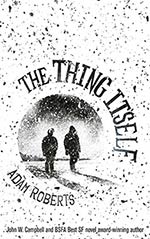
![]() couchtomoon
couchtomoon
4/23/2016
![]()
There's the scene where reality appears to slip away from the protagonist during a peak moment of suspense:
He unclipped his holster and took out his sidearm, but as he did this he began, weirdly, sliding off to the right. He looked like a skater, upright but in motion and slipping out of my field of view.
In fact the whole world was slipping away to the right. I watched the police cars, the officers, the whole scene move away, like a theatrical backdrop being hauled offstage on rails. Then the whole world shuddered and turned, and I nearly fell over. (ch. 7)
But despite the simplistic Dickian feel of the above quote, and the underlying scientific and philosophic rationale of the basic narrative strand, The Thing Itself is itself disorienting, at times frenetic, with the narrative rug pulled out from under the reader at every other chapter change. With all this talk about Immanuel Kant and Joycean pastiche, strict sci-fi and genre readers might be deterred, though the novel is not wholly unapproachable to those unfamiliar but willing accept some minor discomfort and uncertainty, in exchange for a wider approach to the readerly universe.
The only other SF novel I've read that risks building its plot around citing Kantian philosophy is James Morrow's Hugo-nominated Towing Jehovah (1994), which, like The Thing Itself, attempts to shake the foundations of unbelief in its readers: Morrow's in its confrontational way of humanizing the believer antagonists while parodying the atheist protagonists; Roberts' in its coercive way of forcing readers to confront and reassess their sense of the nature of reality. Not many atheist/humanist SF fans will walk away from either novel feeling unruffled, and for that reason, despite crushing on Bête, I admit I kind of dreaded reading TTI.
If you suppose that the primary goal of a science fiction writer is to reconcile the SF reader's craving for sensawunda with their need for rationale, when the willing suspension of disbelief will only occur under the pretense of logic, it makes sense that sharp and clever writers like Morrow and Roberts would be tempted to engage with something as intangible and immeasurable as faith and reality. Perhaps fostering the willing suspension of Un-belief is the post-millennial sci-fi writer's ultimate challenge, but while both novels succeed, they are entirely different. While Morrow's novel is grounded and humanist (and shocking in so many multi-directional ways), Roberts' is cosmical, a metaphysical examination of the universe; Olaf Stapledon plus some twist and minor gore.
There is an -- uncanniness to the narrative. Or not even the story: just to the material fact of the book. (ch. 2)
At first glance, the structure is simple: one PKD-style novella peppered with seemingly irrelevant and abstract short stories, inviting assumptions that The Thing Itself is merely a clever attempt to stitch together a few previously published and unpublished short stories and package them together as a new novel. Readers who have already encountered the previously published delights that are "Thing and Sick" and "Baedeker's Fermi" (which might be my favorite, oh, but then there are unpublished delights like "The Fansoc for Catching Oldfashioned Diseases" and "The Last Three Days of the Time War," oh, and "Penelope's Mother,"...I will never look at Gibraltar the same way again...) will see familiar territory. Readers of old sci-fi and readers of classic lit will also see familiar territory in these stories. However, all of these autonomous stories are connected by threads of philosophical theory and serve to reframe the narrative at each denouement, with each tale serving as a literary bridge to drive the overall generic arc into a cosmic sum, making the parts even more admirable. In other words, the literary interludes add magic and wonder to what would otherwise feel like a clever and neat-o, but somewhat bland and generically-stunted, PKD tribute novel.
...which is kind of an important statement in this era of SF awards hijacked by age-old "genre versus litfic" arguments formed as sociopolitical regression. The Thing Itself demonstrates over and over again: where genre stalls, literary approaches revitalize.
...[cut for space. see blog]...
So, it's not the perfect SF novel (Bête is the perfect SF novel), and yet it feels very much like The New SF Novel, building on and renovating the old, and making something original, while demanding rigor of its readers and its writer. So many of Roberts' novels are blurbed as riffs of some older, crucial genre work, (which, unfortunately, deters a wider audience, limiting his potential audience to fans and critics of the old school), but when they say riff, they mean Tony Iommi riff, not Kurt Cobain riff: the novel might start somewhere catchy and familiar, but it's going to wind up somewhere more complex, augmenting and destroying the original piece, becoming its own thing. Even with such a cosmic scope, it's easy to pare down The Thing Itself to its own itselfness, that weaving together of classic and literary style, pastiche and allusions galore, all culminating into an intimate portrait of Kant's mind in his last days: The Thing Itself is meant to remind us that we all read with our own 'habit-coloured spectacles before our eyes' (ch. 2), and if we remain in those same reading habits, we won't perceive the unseen details that make up the actual structures of all fiction.
It doesn't require prerequisite reading, but it will likely inspire wider reading. The Thing Itself is saying: Read more, read widely, read old stuff, and read better, or you'll be limited to a tiny, veiled universe of your own habitual perceptions.
http://couchtomoon.wordpress.com